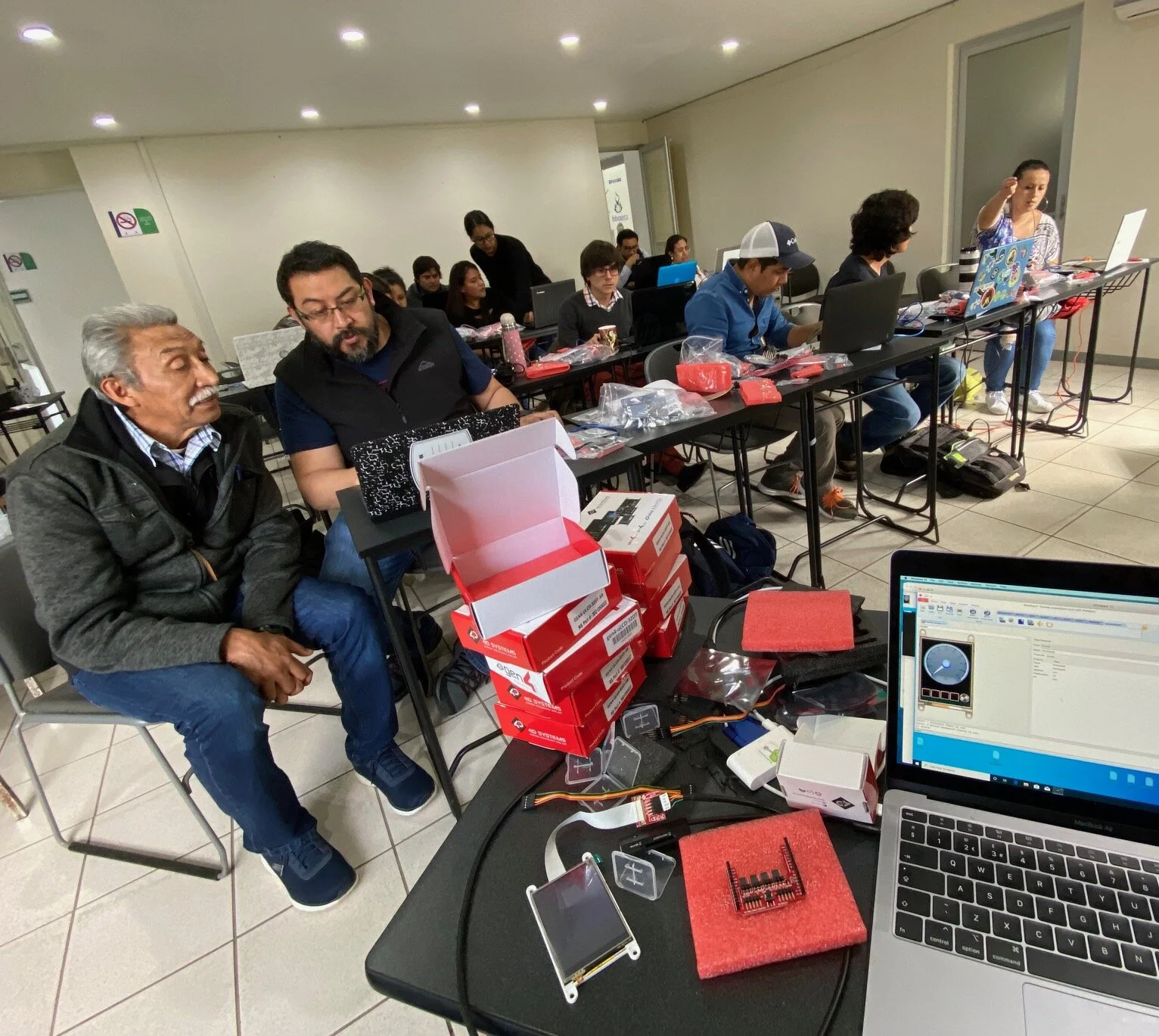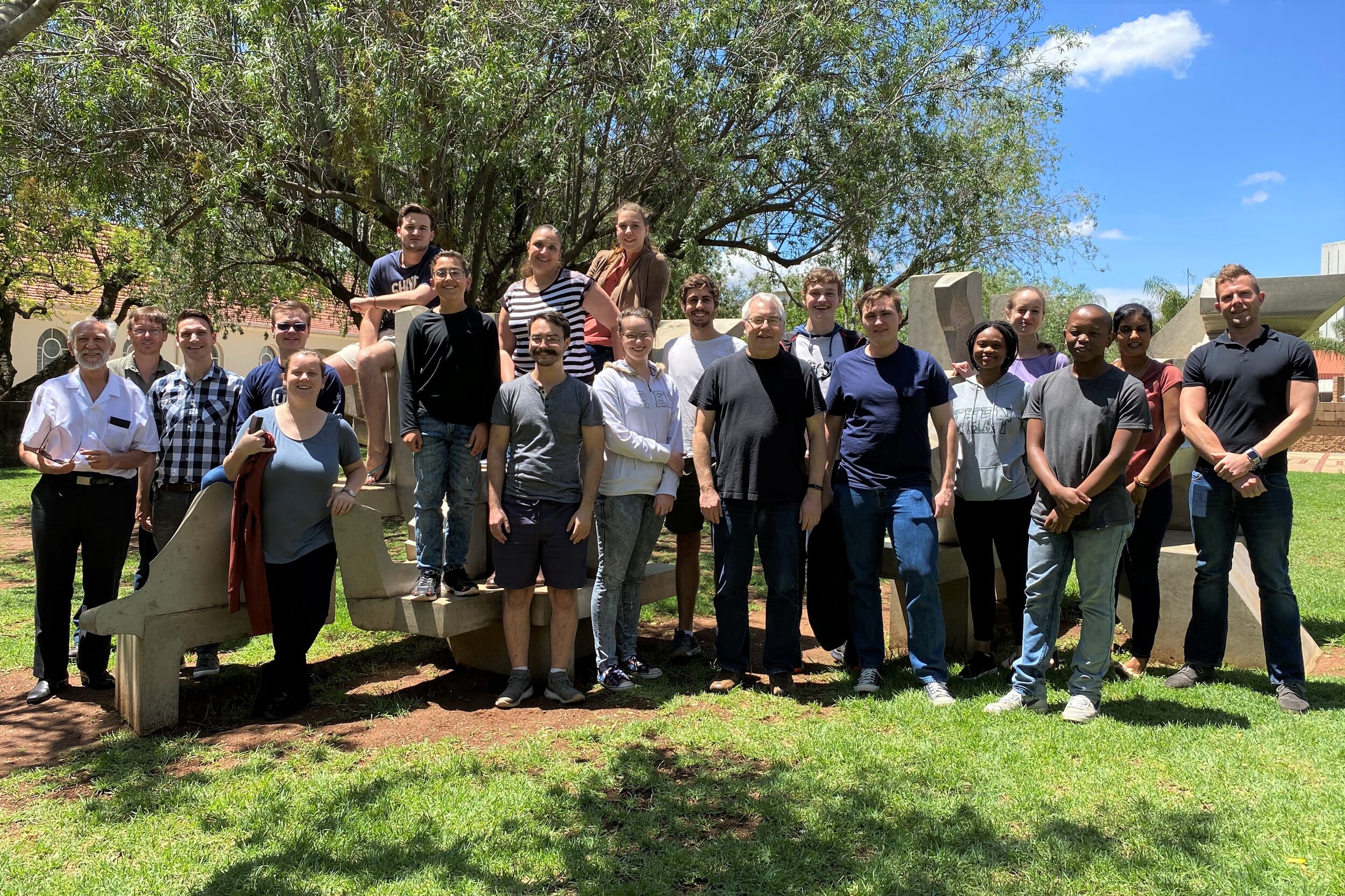No-Code Programming for Biology
Biomaker provides funding for interdisciplinary team-based projects at the intersection of electronics, 3D printing, sensor technology, low cost DIY instrumentation and biology - together with with workshops and outreach events. The Biomaker project aims to build open technologies and promote development of research skills and collaborations. They tap into existing open standards and a rich ecosystem of resources for microcontrollers, first established to simplify programming and physical computing for designers, artists and scientists. These tools allow biologists to program and develop real-world laboratory tools. Further, the Biomaker projects provide a direct route for physical scientists and engineers to get hands-on experience with biological systems.
No-Code Programming online teaching resources
Our no-code programming workshops have been disrupted due to the impact of the coronavirus epidemic. Instead, we have built online activities (i) an introductory course based on distribution of Biomaker Starter Kits and use of online tutorial material, and (ii) a design challenge to build reaction controllers for micro-assays and general biotechnology.
We are looking to recruit biologists and other scientists with little formal experience with programming or electronics. The tutorials are designed to introduce you to Arduino-based microcontrollers, sensors, displays and actuators that are useful for measuring and controlling biological systems - and provide the no-code programming tools that can be used to build integrated bioinstrument prototypes.
Participants will have the opportunity to participate in the 2020/1 Biomaker Challenge, where they can apply for additional funds to pursue a chosen project. Learn more
Click here to visit the new Biomaker channel on YouTube
What is Biomaker? Why is it different?
Biomaker brings together a series of modern tools that allow novice programmers (for example, biologists, non-scientists) to build instrumentation with sophisticated user interfaces - for sensing and controlling biologically relevant parameters. No programming experience is necessary!
1. Simple open-source Arduino-based hardware
Biomaker projects start with a kit of parts that are compatible with open-source Arduino-based hardware (www.arduino.cc) as our starting point. The Arduino community has established open standards and rich ecosystem of resources for simple microcontrollers, first established to simplify programming and physical computing for designers and artists. Arduino circuit boards can be plugged into the USB port of any laptop, and a simple cross-platform programming environment used to program the board. A program is simply loaded to non-volatile memory on the Arduino board, which will execute this program loop whenever the board is powered on - behaving as a dedicated appliance or instrument. Arduino boards include many input/output ports, and are intended to interface with sensors and actuators. The Arduino system provides a simple environment for learning programming and hardware skills, and developing real-world laboratory tools for biologists (Biomaker Starter Kit details)
2. No-code visual programming using XOD
XOD is an open source platform that allows the graphical layout and development of software through connection of a series of on-screen nodes (https://xod.io). XOD allows a visual, dataflow driven approach to programming. It eliminates the complexities of text -based code and syntax. XOD can be used to directly programme Arduino boards, and allows real-time debugging of code. Experienced programmers can encapsulate and share existing Arduino IDE code in graphical nodes. The graphical dataflow layout of a XOD program allows engineers and biologists to better communicate and collaborate in joint projects - facilitating communication between wetware, software and hardware experts (XOD details).
3. Graphical user interfaces
Biomaker has adopted the use of touch-responsive programmable displays, along with code-free systems for programming the screens and communication with any Arduino microcontroller. A XOD library for direct serial communication between the Arduino display is available - along with sophisticated development tools that allow graphical programming of a wide range of display widgets like gauges, switches, sliders, readouts, etc., for creating customised touchscreen user interfaces. This allows great flexibility in the design of the interface - and can simplify an instrument’s control or display (Touchscreen details).
4. Expandable
We are exploring hardware expansion packs that are designed to support biologically orientated engineering projects. These include (i) Totemmaker chassis assembly components with struts, sheets and fasteners, and 3D printing resources for development of custom chassis. (ii) Laboratory-based measurements involving tubes/cuvettes/paper assays and optical techniques for colour/fluorescence/luminescence detection, temperature control with LEDs, plastic fibre optics, etc. (iii) Environmental measurements using solar panels and sensors for parameters such as temperature, humidity, soil moisture, chemistry, atmospheric pressure and actuators for pumps, motors, etc. (iv) Future plans include addition of a kits for cell-free gene expression, curriculum development, macroscopy-microscopy and machine learning.
5. Transferable skills
Training in the use of these new tools allows biologists to build a wide range of instruments and devices that are potentially useful for experiments in the lab and field. These new skills can be enabling in many ways. The components for this type of instrumentation are often very cheap, especially when compared with off-the-shelf commercial solutions. The use of simple hardware and software resources allow easy modification, extension and repair of custom instruments. The use of open-source components and systems promotes sharing of information and set up of collaborative projects, which creates a growing set of resources for the community to draw from.
The Biomaker Challenge
We have organised annual Biomaker Challenges for the last three years (2017-2019) for interdisciplinary teams to build low-cost instruments for biology. 88 projects have been funded that involved around 300 participants from Cambridge, Norwich and beyond. This complements the OpenPlant Fund, which has funded a total of 71 interdisciplinary and cross-institute projects.
OpenPlant and Biomaker are working with Global Challenges Research Funds and African partners to develop resources for open and accessible teaching resources for engineering biology. We have supported a workshop on Practical Synthetic Biology: fast, frugal and open technologies for education and sustainable development in Africa, resulting in the Bakubung Report. OpenPlant has supported the JR Biotek Foundation Workshops in Cambridge and the Benin Republic, attended by African researchers. Biomaker is working with partners at the Kumasi Hive in Ghana, Mansoura University, Egypt; University of Pretoria, South Africa; Bahir Dar University, Ethiopia and University of Adelaide, Australia to develop international Biomaker Challenges.
As part of the recruitment of international teams, we have established a web-based platform for documentation of Biomaker projects at https://www.hackster.io/biomaker/.
A full list of about 170 completed projects can be found here.
Latest News and Updates
COVID-19 projects
Summary of projects initiated in the COVID-19 lockdown - building online resources for Biomaker training, and 3D printed microreactors for low-cost diagnostics - as well as DNA assembly, amplification and cell-free gene expression. Contains links to online documentation at hackster.io. Click here to see index
Project funding
Since 2014, we have funded small interdisciplinary projects and catalysed new collaborations between several hundred students, researchers and academics across Cambridge, Norwich and beyond. A comprehensive listing of these projects is provided here, along with links to open resources generated during the work. The projects have generated a large number of electronic prototypes, software, 3D printed devices and biological elements. We hope that these resources prove useful and can be built upon by others, especially as initiators for new low-cost approaches to quantitative biology and engineering for teaching and research. Please contact us if we can assist in any way.
The Biomaker projects have been funded from a variety of sources, starting with support for mini-projects by a Strategic Research Initiative in Synthetic Biology at the University of Cambridge. This was followed by major support (£0.5M) from the BBSRC/EPSRC OpenPlant Synthetic Biology Research Centre, and support from the University of Cambridge Research Policy Committee through the Synthetic Biology Strategic Research Initiative and CamBridgeSens Strategic Research Network. A number of these funding opportunities are ongoing and we actively promote wide participation both within Cambridge and Norwich, and from external partners - including international collaborations at the level of individuals, companies and institutions. In particular, the new Biomaker Challenge has been designed to be easily portable between institutions and open to industrial collaboration, and we invite anyone interested to get in touch.
Synthetic Biology meets real world instrumentation
The Biomaker programme provides funding for interdisciplinary team-based projects at the intersection of electronics, 3D printing, sensor technology, low cost DIY instrumentation and biology - and policy workshops and outreach events. These projects aim to build open technologies and promote development of research skills and collaborations. They tap into existing open standards and a rich ecosystem of resources for microcontrollers, first established to simplify programming and physical computing for designers, artists and scientists. These resources provide a simple environment for biologists to learn programming and hardware skills, and develop real-world laboratory tools. Further, the Biomaker projects provide a direct route for physical scientists and engineers to get hands-on experience with biological systems.
Biomaker organises regular training sessions for non-programmers.
Documented projects
We have organised annual Biomaker Challenges for the last three years (2017-2019) for interdisciplinary teams to build low-cost instruments for biology. 88 projects have been funded that involved around 300 participants from Cambridge, Norwich and beyond. This complements the OpenPlant Fund, which has funded a total of 71 interdisciplinary and cross-institute projects.
We adopted the visual programming interface XOD to tackle some of the bottlenecks and difficulties that non-programmers face when building electronics, and implemented a training programme aimed at teaching basic hardware and software for scientists. We’ve organise hands-on workshops to encourage the development of new biological technologies through the OpenPlant Fund.
A full list of about 150 completed projects can be found here.
OpenPlant and Biomaker are working with Global Challenges Research Funds and African partners to develop resources for open and accessible teaching resources for engineering biology. We have supported a workshop on Practical Synthetic Biology: fast, frugal and open technologies for education and sustainable development in Africa, resulting in the Bakubung Report. OpenPlant has supported the JR Biotek Foundation Workshops in Cambridge and the Benin Republic, attended by African researchers. Biomaker is working with partners at the Kumasi Hive in Ghana, Mansoura University, Egypt; University of Pretoria, South Africa; Bahir Dar University, Ethiopia and University of Adelaide, Australia to develop international Biomaker Challenges.
As part of the recruitment of international teams, we have established a web-based platform for documentation of Biomaker projects at https://www.hackster.io/biomaker/.
SynBio SRI Fund
The SynBio Fund supported eighteen innovative, open and interdisciplinary projects relevant to Synthetic Biology over 2015-16. The aim of the fund was to promote the development of Synthetic Biology as an interdisciplinary field at the University of Cambridge.
OpenPlant Fund
The OpenPlant Fund supports innovative, open and interdisciplinary projects relevant to plant Synthetic Biology. The fund facilitates exchange between the University of Cambridge, the John Innes Centre, and the Earlham Institute for the development of open technologies and responsible innovation.



























